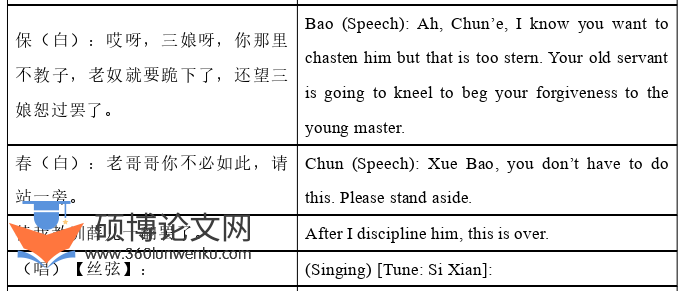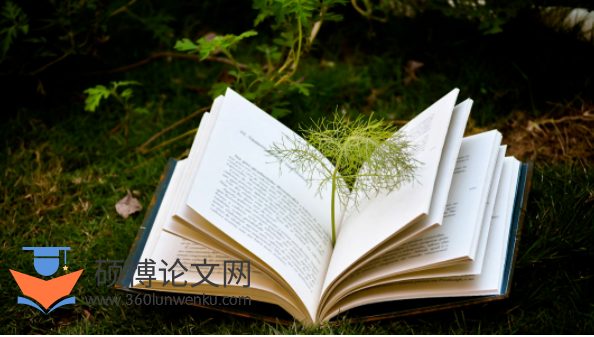本文是一篇英语论文,笔者认为戏曲翻译具有较强的跨学科性和专业性,本翻译报告结合在翻译过程中所发现的问题,结合戏曲文本的特点,对本次翻译实践进行总结,并得出相应的结论。
Chapter One Introduction
1.1 Description of the Source Text
The source text in this translation report comes from the Charm of Opera:Collectionof Guangxi Wenchang Opera Text(hereinafter referred to as Charm of Opera)by HeHongyu,who is born in Lipu,Guilin,Guangxi Zhuang Autonomous Region and is therepresentative inheritor of Guangxi Wenchang Opera,which belongs to the second batch ofstate-level intangible cultural heritage projects.She is 82 years old and has been devotedherself to the inheritance and development of the Wenchang Opera.
She has done deep research on the history,schools,singing styles and scripts ofWenchang Opera,collected a huge amount of relevant materials,audio and videos,andpublished several books about it.And the Charm of Opera,one of her books mainlycontains the scripts of Guangxi Wenchang Operas,which include three parts:OfficialScript,Drama,and Singing Part.Most plays in Official Script are from classic novels ordramas for example A Dream of Red Mansions,Romance of the Three Kingdoms,WaterMargin,The Romance of the West Chamber,and so on.The Drama part mainly includesplays that are adapted from popular folk stories or mythology and usually,they are bothhumorous and educational.They embody the people’s yearning for a better life.Singingparts in this book come from other operas but with Wenchang’s unique singing styles.Thistranslation task has chosen three plays in the Drama part as the selected text,and they areChun’e Teaches Her Son,Imperial Position Granted in Jade Long Saloon,and Lanting’sDream of Spring.

英语论文怎么写
....................................
1.2 Translation Significance
The selected texts are of great importance to translate.The translator shall discuss it inthree dimensions.
Firstly,translating this material can help the the Chinese opera culture to spreadinternationally.Since the foundation of the People’s Republic of China,there are a lot oftranslators had translated and introduced Chinese operas to the world.For example,Lady of Precious Stream and The Romance of the West Chamber by Xiong Shiyi,Gems ofKunqu Opera by Wang Rongpei,and The Palace of Eternal Youth by Yang Xianyi and DaiNaidie.As well as the famous drama The Orphan of the Zhao Family,which broughtChinese drama fever around the world.Since the 18th century,China’s traditional operashave been translated and spread over several centuries.Numerous Chinese and foreigntranslators have participated in the translation of China’s traditional operas,making theircontribution to it.However,the value of China’s operas has not been recognized by thewhole world,the status of China’s operas has not been established on a global scale,andthe China culture conveyed by China’s operas has not been universally understood.Just asDong(2017)pointed out:“China Opera is still on the way to spreading.Although today'sworld accepts cultural diversity with an extremely open mind,just like Shakespearebelongs world,and Tang Xianzu only belongs to China,China’s Opera still has a long wayto go.”As a part of China’s traditional operas,Guangxi Wenchang Opera should alsofollow the pace of the times,go abroad,and show its light on the world stage.Thetranslator hopes that this translation practice may help the Guangxi Wenchang Opera to goabroad.
Secondly,the translation of the selected texts can help to pass on the Wenchangculture.Wenchang Opera is a distinctive opera in the Guangxi Zhuang AutonomousRegion,and an important part of China’s intangible cultural heritage.It is performed withGuilin accent which embodies the features of Northern Guangxi.Though the selected textsare opera scripts and most of them are dialogues,they are exquisite in words,brilliant inexpressions,rich in allusions,and still easy to read and understand,which satisfies bothrefined and popular tastes.Different characters in different roles have diverse languagestyles thus making it full of variety.In addition there are a lot of culture-loaded words andopera terms.Therefore,the scripts of this opera is highly attractive.By translating theselected text,the translator can make contributions to the cultural inheritance and exchangeof Wenchang opera.
...............................
Chapter Two Description of TranslationProcess
2.1 Pre-translation
2.1.1 Analysis of Source Text
Before any translation,it is essential to have a good and thorough understanding ofthe source text.So,the translator paid an effort to the contents of the selected texts.Thefollowing main contents of the three plays are Chun’e Teaches Her Son,Imperial PositionGranted in Jade Long Saloon,and Lanting’s Dream of Spring.The first play mainly tellsthe story of Wang Chun’e’s husband suddenly died in a remote town,leaving only her anda young child Xue Yi at home.Wang Chun’e weaves silk to support her family,but Xue Yiskips classes to play,which makes Wang Chune angry.When he comes back,she begins toeducate him.This article mainly reflects the hardship of being a single mother under theshackles of feudal ethics and the mother’s urgent mood of wishing her children success.The second part is mainly adapted from the story of Emperor Yongle of the Ming Dynastywho traveled incognito to find talent.It is said that the emperor had a dream,and theperson who interpreted the dream told him that he would have a virtuous official whilecelebrating the Lantern Festival with people,so the emperor did the same.He met Bai Jian,a scholar who failed the imperial examination in Jade Long Saloon.And after somecommunications,the emperor found him full of literary talent,so he was called into thepalace and made an imperial official.This story is humorous in style,which embodies thatpeople in ancient China hoped to have good scores in the imperial examination to achievesuccess.The third story is mainly about a fairy who is banished to earth because she startedto possess the emotion of love,and cultivated herself for thousands of years.Then she metXiao Lanting,a scholar who got lost on a spring outing and fell in love at first sight.Itexpressed the people’s longing for immortality and beautiful love at that time.
.................................
2.2 While-translation
2.2.1 Difficulties in Translation
During the translation,the translator encountered many difficulties in the selected text,which can be discussed in three dimensions.
Lexically,the selected texts contains many expressions that are hard to translate.Forexample,“母亲在上,孩儿拜揖”,“结下丝罗”,“一点如桃之笔”,“胭脂雪”,“掉有灯”and“旨罢三呼”.These expressions contain a lot of cultural connotations.The translator has tomake sure the translation is able to convey its cultural background.Also,there are someexpressions that are hard to understand such as,“瞒不尽”,“未有颠”,and“多便了”.Theseexpressions are full of the characteristics of the northern Guangxi dialect,which is hard tosearch for the correct or even relevant answers.
On the syntactical level,the selected texts has plenty of poem verses and couplets.Forexample,“平顶栽上一枝花,太阳一出照乌纱”,“孔子门下有三千,内有七十并二贤”,and“铁匠赶工红火炉中三闪电,弹棉弓响白云洞内一声雷”.This means the translatorneeds to have a thorough understanding of these lines in order to give a more accurate andcoherent translation.
Textually,the selected texts has both singing parts and conversations.Though thereare signs in the text to distinguish them,it is still essential to make a distinction in the styleof the translation of the selected text.Also,there are some homonymic expressions in theselected texts to create some humor.How to convert them into the target language whilekeeping the function of comedy can be a problem for the translator.
.........................
Chapter Three Theoretical Guidance ............................. 9
3.1 Introduction of Pragmatic Equivalence ................................. 9
3.2 Application of Pragmatic Equivalence in this Practice ................. 11
Chapter Four Case Study ....................................... 13
4.1 Linguo-pragmatic Equivalence ................................... 13
4.1.1 Translation of Terms ......................................... 13
4.1.2 Translation of Ambiguous Expressions ...................... 15
Chapter Five Conclusion .......................... 23
5.1 Gains ......................................... 23
5.2 Expectations ......................... 24
Chapter Four Case Study
4.1 Linguo-pragmatic Equivalence

英语论文参考
In this part the translator shows a couple of examples about the problems that thetranslator had met during the translation and the process of problem solving to achievelinguo-pragmatic equivalence.
4.1.1 Translation of Terms
The selected texts is opera scripts of Guangxi Wenchang Opera.Therefore there arename of the roles.But most translators had translated them using transliteration way.Thatis to say just simply translate“花旦”into“Huadan”.But the translator believes there isanother way to deal it.Zhang(2013)pointed out that unlike“Kung Fu”and“Kung PaoChicken”,which are already widely known by the world,the name of roles in Chineseoperas are not that popular in the world.Therefore,the first principle of translating theseterms should be that the target language readers can easily accept them.
Source Text 1(ST 1):王春娥(简称“春”,旦)薛义(简称“薛”,小生)薛保(简称“保”,老生)(p.26)Target Text(TT 1):Wang Chun’e(Referred to as“Chun”.Role:Female)Xue Yi(Referred to as“Xue”.Role:Junior male)Xue Bao(Referred to as“Bao”.Role:Senior male)ST 2:霞娘(简称“霞”,花旦)(p.60)TT 2:Xia Niang(referred to as“Xia”,Role:Vivacious female)
Analysis:The translator used the gender of the roles to divide them into male andfemale.Then according to the character’s features,the translator put the appropriateadjectives.For example,“老生”and“小生”in the ST 1,these two expressions in the operamean elder male characters and younger male characters,so the translation“elder male”and“junior male”can match the original meaning.This means the translation has reachedthe maximum relevance with the original context.Also,the translation of“旦”and“花旦”in the ST 2 keep their original form which is an adjective with a head.This way readerscan better understand the characteristics corresponding to the roles,thus achievinglinguo-equivalence.
...............................
Chapter Five Conclusion
5.1 Gains
By translating the selected texts,the translator acquires a lot of opera terms from them.For example,the roles'names and the tunes’names.These scripts from the selected partare variant in rhetorical skills and rich in allusions.This provides the translator with morechallenges but also a great opportunity to combine the practice with the theory and learnmore.The plot and the spirit that it conveys also give the translator a unique experience ofthe beauty of the Wenchang Opera.Through this translating practice,the translator gains a lot of translating knowledge,about translation theories,strategies,and methods as well as how to combine the practicewith the theory and let the theory guide practice.This will surely be of great benefit for thefuture development of the translator.
The translation still has a lot of places that are not well translated,partly because thetranslator still needs more knowledge and experience.For example,in Chapter 4,thetranslator mentioned the way of foreignization through annotation.The TT 18 should havea better way to transfer all the information that it has to the target readers without that longannotation.The translator believes that through future learning and practice,this problemcan be solved.
reference(omitted)
